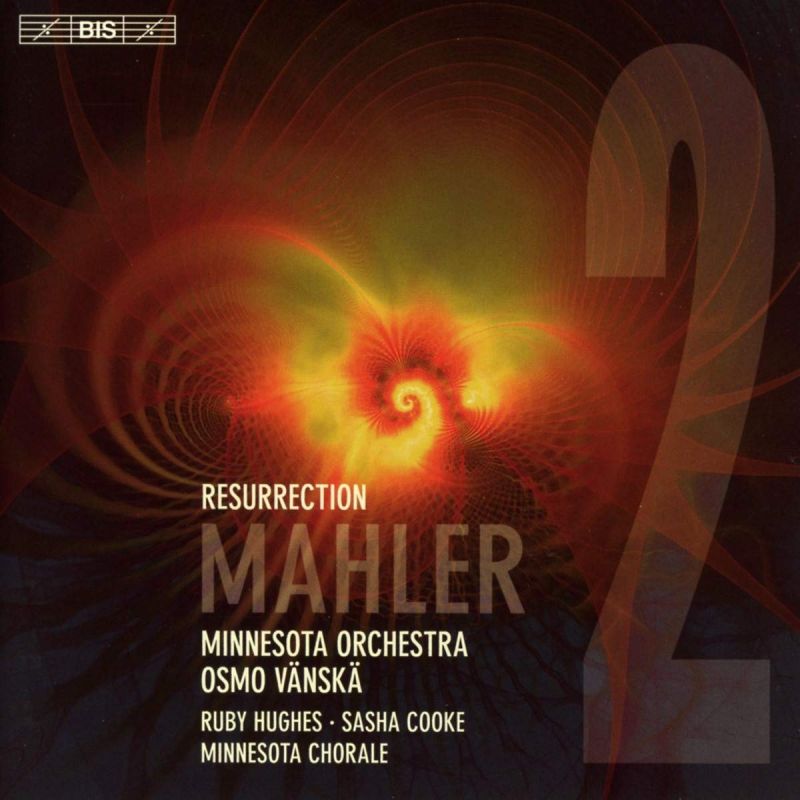MAHLER Symphony No 2, 'Resurrection’ (Vänskä)
View record and artist detailsRecord and Artist Details
Composer or Director: Gustav Mahler
Genre:
Orchestral
Label: BIS
Magazine Review Date: 03/2019
Media Format: Super Audio CD
Media Runtime: 85
Mastering:
DDD
Catalogue Number: BIS2296

Tracks:
| Composition | Artist Credit |
|---|---|
| Symphony No. 2, 'Resurrection' |
Gustav Mahler, Composer
Gustav Mahler, Composer Minnesota Chorale Minnesota Orchestra Osmo Vänskä, Conductor Ruby Hughes, Soprano Sasha Cooke, Mezzo soprano |
Author: Edward Seckerson
Consider the weight of expectation that arrives with the opening pages of the Second Symphony: the nerve-racking tremolando in the strings (where the spectre of the storm prelude to Wagner’s Die Walküre looms large); the ferocious interjections from lower strings; the imminent arrival of a march-like strain in the winds. With Vänskä our attention is entirely focused on the notes: the precisely foreshortened tremolando (which can be a cliffhanger depending upon how the conductor interprets the value of those opening bars), the clipped response to the cello and bass flourishes. Incisive, yes; dramatic, no. Entirely cosmetic, it would seem – an appreciation of the notes but not the reasons for them. Where is the weight of expectation, the heft, the daring behind these opening gestures? The ‘shock of the new’ is a phrase that might have been coined for this movement.
There are other indications which point to how deeply un Mahlerian Vänskä’s performance is. The portamento ‘sighs’ which mark the wind-down into the tentative reappearance of the second subject sound almost embarrassed to be there – like they are written and therefore must be observed without quite knowing why. At least that second subject brings with it a bit of magic – the kind of hush that spells solitude in Vänskä’s Sibelius. Suddenly he and his Minnesota Orchestra sound thoroughly engaged.
But mostly we – and Mahler – are short-changed. Where is the shock and awe of the great development climax of this first movement? Why (and this is a common oversight) is the molto pesante at the arrival of those horribly dissonant chords – poised to batter us into submission – virtually ignored? If you are a Bernstein you understand the shock tactic of arriving on the first of these chords as if jamming on the brakes of a juggernaut. No ritardando into them or after (which is Vänskä’s compromise). It’s hard to pull off – Mahler’s awkwardnesses are part and parcel of his innovative nature – but get it right and it’s like a fissure opening up in the fabric of the symphony.
For the rest, Vänskä’s second movement is deftly, elegantly served – though I don’t feel the connection with the first movement. The third-movement Scherzo doesn’t sound like Mahler at all, the sentimental Trio with its close harmony trumpets too hurried and in-tempo to convey that rosy (slightly cheesy) nostalgia.
The soft maternal tones of Sasha Cooke (a lighter mezzo sound than we are accustomed to) bring a quiet determination and hope to the ‘Urlicht’ and the special effects of the finale’s ‘Judgement Day’ evocation are expertly stage-managed (excellent job, the BIS engineers), hitting all its marks without ever, for my money, inspiring awe. The import and substance of the big moments just isn’t there.
The great choral peroration never fails to thrill, of course, but you don’t feel the accumulative elation and release conveyed by a conductor like Vladimir Jurowski (a live LPO recording full of revelations, big and small – 8/11) or the fervent ‘rightness’ of Bernstein, whose LSO recording (though technically wanting – Sony, 11/74) takes the Mahlerian theatrics to an almost cosmic level. That isn’t in Vänskä’s nature or his gift.
Explore the world’s largest classical music catalogue on Apple Music Classical.
Included with an Apple Music subscription. Download now.

Gramophone Digital Club
- Digital Edition
- Digital Archive
- Reviews Database
- Events & Offers
From £9.20 / month
Subscribe
Gramophone Club
- Print Edition
- Digital Edition
- Digital Archive
- Reviews Database
- Events & Offers
From £11.45 / month
Subscribe
If you are a library, university or other organisation that would be interested in an institutional subscription to Gramophone please click here for further information.






